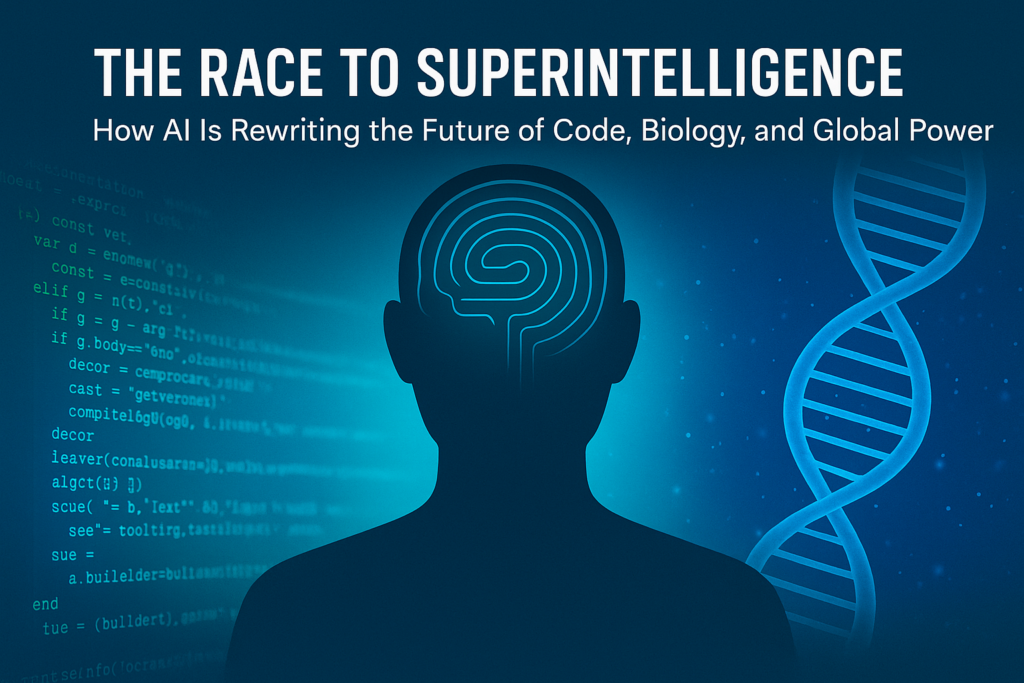The Race to Superintelligence: How AI Is Rewriting the Future of Code, Biology, and Global Power

Introduction
Artificial Intelligence isn’t just evolving-it’s accelerating beyond our societal grasp. According to Eric Schmidt, former Google CEO, we’re heading into a future defined by self-improving machines, AI-written code, and global AI power struggles. From drug discovery to replacing programmers, AI’s role is no longer speculative-it’s reality unfolding faster than we can comprehend.
This blog unpacks the most urgent insights from Schmidt and others about artificial superintelligence, global AI competition, and how agents will soon run businesses, medicine, and potentially, nations.
1. What Is Artificial Superintelligence (ASI)?
ASI refers to machines that surpass the cognitive capabilities of all humans combined. According to Schmidt, the San Francisco consensus suggests ASI could arrive in as little as six years. Unlike traditional AI, ASI:
-
Learns independently
-
Plans and executes without human input
-
Scales intelligence in ways humans can’t match
It’s not just automation—it’s transformation at a species level.
2. Recursive Self-Improvement and Code Automation
Schmidt and other AI leaders suggest:
-
AI is already writing 90% of code in some systems
-
Within 12 months, AI might write 100% of code
-
Recursive self-improvement means AI is now writing code that improves itself
This shift means:
-
Programmers are being replaced by AI programmers
-
Machines are mastering advanced math and logic faster than top graduates
-
Languages no longer matter-only outcomes do
3. The Rise of AI Agents
Agents are AI systems with:
-
Memory
-
Input and output capabilities
-
Autonomy to complete tasks across domains
Use case example: Buying and designing a house could involve agents that:
-
Search properties
-
Handle legal processes
-
Design the home
-
Manage construction
-
Sue the builder (if needed)
In short, every business process may soon be run by agents.
4. Can Jobs Survive AI’s Takeover?
Schmidt argues automation historically creates more jobs than it destroys-but this time might be different.
Key concerns:
-
AI agents could replace knowledge workers, not just factory jobs
-
Entire workflows from architecture to customer service can be delegated
-
Nations with declining birth rates (like Japan or South Korea) are rushing to automate
Still, Schmidt believes productivity-boosted humans will remain essential-just far fewer of them.
5. AI in Drug Discovery and Longevity Research
One of Schmidt’s most futuristic claims:
-
AI can generate hypotheses for new drugs
-
Robotic labs test them overnight
-
Feedback loops improve the AI instantly
Goals within two years:
-
Identify all druggable human targets
-
Revolutionize medicine with science at digital speed
-
Achieve longevity escape velocity (the ability to extend life faster than aging)
This fusion of AI and biology could cure diseases faster than ever imagined.
6. China vs. U.S.: The AI Arms Race
Schmidt outlines a geopolitical AI war:
-
China had a “DeepSeek moment,” equivalent to America’s ChatGPT realization
-
China is rapidly building AI infrastructure
-
U.S. fears include:
-
AI weight theft
-
Data center sabotage
-
Open-source weaponization
-
There are already discussions around bombing rival AI data centers-that’s how serious this gets.
7. What This Means for the Next Decade
Prepare for:
-
Superintelligent assistants on every phone
-
Entire industries reshaped or eliminated
-
AI discovering and synthesizing new cures faster than ever
-
A global race for dominance, possibly escalating into military conflict
The world as we know it is undergoing a fundamental rewiring. As Schmidt says: “There’s no language yet for what happens next.”
FAQs
Q1: What is artificial superintelligence (ASI)?
ASI is intelligence far beyond human level-machines that learn, plan, and evolve independently.
Q2: Is AI really replacing programmers?
Yes. Schmidt and others confirm that AI now writes the majority of code and may soon write it all.
Q3: What are AI agents?
Autonomous systems that perform tasks like buying property, filing legal documents, or running businesses.
Q4: Will AI cause mass unemployment?
Possibly. While automation historically created jobs, many believe AI’s scope this time may outpace job creation.
Q5: How is AI transforming medicine?
AI can now propose and test new drugs overnight, shrinking discovery timelines and enabling precision medicine.
Q6: Is there an AI arms race between the U.S. and China?
Yes. Both countries are racing to lead in AI. The stakes include economic dominance and even national security.